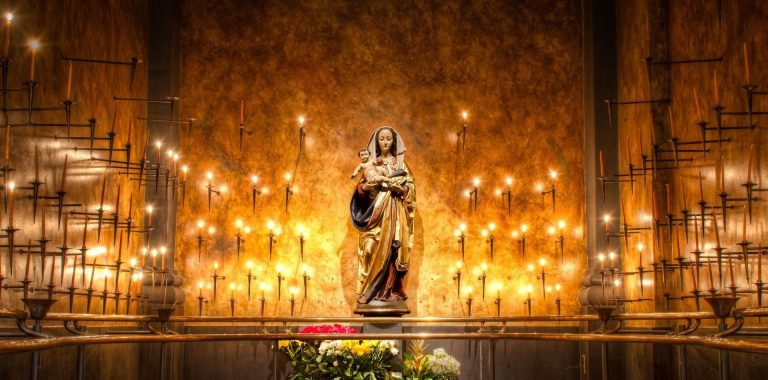[fbshare type=”button” float=”right” width=”100″] By Holly Ordway

Halloween has been murdered.
No, that’s not the start of a tacky horror movie. Rather, it’s a sober assessment of the culture. How do I know that this holiday has been done to death? Because if I were to say, “Halloween is an opportunity to help young people get excited about their journey to Heaven!” most readers would respond, “What on earth is she talking about?!”
“Halloween” and “Heaven” are not usually found in the same sentence, precisely because Halloween is a victim of verbicide.
In Apologetics and the Christian Imagination, I write about the way that words can lose their meaning, or have their meaning grossly distorted, by either accidental or deliberate mis-use. The word ‘sin,’ for instance, has been distorted so much that it often is used to mean ‘enjoyable’: just look at the frequency of phrases like “sinfully good” or “sinfully delicious.” That’s verbicide: the killing of a word’s real meaning.
Our post-Christian popular culture is trying very hard to shed all vestiges of the sacred; part of this process involves inventing a sort of secular liturgical cycle. That’s why minor days like Valentine’s Day have become inflated. That’s why Pumpkin Spice gets added to everything in the fall: it’s the secular replacement for the season of Advent. We human beings have a deep-seated need for ritual and celebration, and if we don’t have the real thing we’ll try to concoct a substitute.
Halloween has been co-opted into this ersatz liturgical cycle, as a day of candy and creepy costumes, because its original sacred meaning has been lost—in fact, killed by secular culture.
Look at the formation of the word. It used to be written as “Hallowe’en”—and that little apostrophe was telling. The word originally was “Hallow e’en”—that is, Hallow evening. “Hallowed” means holy. All Hallow’s Eve is the Vigil of All Saints’ Day. That’s the real celebration. The evening before, with its tales and dress-up of ghosts and goblins and what-not, and its distribution of candy, is just tacked on.
The real celebration ought to be all about the saints, and our becoming saints.
Yet for most people, and I venture to say a lot of Christians too, the idea of celebrating saints seems a bit . . . well, dull. I suspect that many people secretly echo the pre-conversion St. Augustine, saying in their hearts, “Lord, make me a saint . . . but not yet.”
In fact, the word ‘saint’ is another victim of verbicide.
What is a saint, anyway? And what do we mean when we use the word?
A saint, in point of fact, is a person who has died in friendship with God, passed through the cleansing of Purgatory, and is now in Heaven, that is, the full presence of God. We are all called to become saints—every single one of us, without exception.
The saints in Heaven help us with their prayers; they intercede for us, and they are role models, friends, and guides, just as if we knew them during their earthly lives. That’s what the ‘communion of saints’ means: we are in union with them, as fellow members of the Body of Christ. They’re praying for us and helping us even if we are unaware of them, but the Church, in her wisdom, wants us to know about them, so that we can call on them for help and be inspired by their lives. That’s why the Church canonizes saints.
Now, let’s be clear: the Church doesn’t make saints; only God makes saints! The Church just recognizes the saints that God has made. That’s why the evidence of miracles that occurred by the intercession of the saint is usually required for official canonization: this shows that the saint really is in Heaven, perfected and ready to help others, not still working through Purgatory.
We should all want to be saints—but unfortunately, ‘saint’ doesn’t sound very interesting to most people.
Part of the problem is that in popular usage, words like ‘virtue’ and ‘holiness’ have a vaguely stuffy, Sunday-school, tacky-afterschool-special flavor to them. (More evidence of verbicide!) The words may even have a negative connotation: nagging and priggishness and holier-than-thou behavior. And in our current media culture, vices are all too often made to look exciting and attractive while virtue is made to look dull and unappealing. That’s the Enemy’s work, right there.
Nevertheless, becoming a saint is the most exciting adventure that there is. Difficult, at times painful; yes, to be sure. But rewarding beyond anything else we can even dream about.
So how do we restore meaning to the words ‘saint,’ and ‘virtue,’ and ‘holiness’? How do we encourage people (especially young people, but really everyone!) to be excited about these things? Well, one very good way to start is to celebrate the saints. Learn about them; see the diversity of their lives; make friends with them; be inspired by them. Just to name a few of my own favorite saints—do you know about St. Therese of Liseux, St. Hilda of Whitby, St. Pio (Padre Pio), Bl. John Henry Newman, St. Thomas More, St. Philip Neri. . . ?
If you’re minded to give out candy on All Hallow’s Eve, by all means do so. But don’t forget the real holiday—the real holy day.
Don’t let verbicide claim another victim. Celebrate the saints!
In Holly Ordway’s book Apologetics and the Christian Imagination: An Integrated Approach to Defending the Faith, discover how reclaiming the meaning of words like “saint” and “Halloween” can evangelize the imagination by communicating truth.